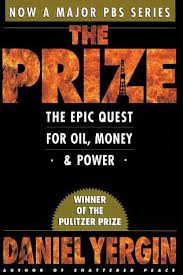Costly Prize
Daniel Yergin writes big histories. Trained at Yale and Cambridge, his first book was Shattered Peace: The Origins of the Cold War and the National Security State. Way back in my Master’s program at NYU, I took a course from McGeorge Bundy, former National Security Advisor to Presidents Kennedy and President Johnson. One of the recommended books in Bundy’s course was Yergin’s Shattered Peace. I remember talking with Bundy about it. He did not place a ton of stock in the wisdom of any singular historian. However, he thought well of Yergin. Bundy greatly enjoyed asking students difficult questions about historical narratives. He liked to challenge us to think hard and critically about any thesis of explanation, anything that might render a complicated history simply or neatly. In other words, beware of summation – but if you have the facts (and Yergin did – at least in Bundy’s eyes), then feel free to go ahead with the big narrative. 
Those memories and more were with me when I recently read Yergin’s well-known epic on the oil industry, The Prize: The Epic Quest for Oil, Money and Power. It won a Pulitzer in 1992 and Yergin has issued slightly updated versions. A documentary about it was produced in the mid-1990s. It was a book I had known about. The suggestion of a colleagues, along with the rise of the leadership of the oil and gas industry in the Trump administration, was just the catalyst needed to tackle this massive work. It turned out as grand, exciting and troublesome as I anticipated. It also remains extraordinarily relevant to foreign policy and economics today.
Yergin takes the long view of oil’s history. No, he doesn’t start with the chemistry, And while we are on complaints, the book is short on maps. It would benefit, too, from more charts and tables. Yergin begins with two parallel nineteenth century historical narratives: oil exploration and production in the US, and oil exploration and production in Europe and Asia. It is not an easy device, but he handles the multiple international strands with skill.
Few historians are able to write as clearly, critically and effectively as Yergin. It is popular history that is carefully sourced and argued. He focuses on key individuals, sketches them quickly (and always with a few telling anecdotes or eccentricities), and frames the larger narrative through the actions and conflicts of a few. It is “great man” history – but Yergin is under no illusions that there are great men. They are smart, ambitious, greedy and comfortable with risk. They are in perpetual conflict: with nature, with market forces, with governments, and with each other. They are also, by definition, successful and important.
Yergin moves steadily through the 19th and 20th century, focusing consistently on the exploration, transportation, refining and sale of oil. His heart is with the wildcatters and the empire builders. By the post-WWII years we read about those that put together gas stations for sales, but Yergin has less enthusiasm for trends in marketing oil or its impact on the economy. In contrast, the global financiers, shippers, explorers and leaders – those are the men (and they are 99% men) – that are the heart of his history.
Read in a different light, The Prize is a helpful counter-narrative to other more well-known historical treatments of the past 150 years. Historians tend to cluster in camps. The Marxists look to the means of production. Some see race. Others focus on the rise of nationalism. Yergin looks at the big picture through the lens of energy, primarily oil. There’s much to recommend in this analysis.
Japanese expansion in Asia was shaped in great part by the island’s ability to capture and exploit oil. The Great War was driven by energy needs and competition for expansion. The US’s rise to a global economic power was powered in great part by America’s tremendous national resources – in particular, its oil. US relations with Mexico, as well as Venezuela, was again shaped by oil. The battles of World War II, Yergin notes, were again and again determined by a military’s ability to capture and use energy – oil.
The strands all come together in Yergin’s discussion of the colonization and exploitation of the middle east. It is distressing – with a great sense of foreboding – to see the fault lines being developed in the early part of the 1900s and then play out again and again. Shia against Sunni, Saudi Arabia against Persia/Iran, and all the ways that western powers fought to gain oil and economic advantage. Yergin’s long history gives a foundation and context that makes the wars of the past 10 years all the more understandable. Unfortunately, the history also points to no new possible resolutions.
This is not easy history. It is sprawling, messy, and consistently about conflict. There are few heroes. There may be great men, but missing is generosity, kindness, altruism or much hope for our better halves. Victory is often gained by those that have the most – or those that are willing to lose the most in order to prevail. It offers little by way of mankind thinking differently about energy or how best to use it. It also goes far in explaining much of our current problems – political, economic, international and environment. It is history as conflict. Yergin is completely up front about his agenda. There is good reason that he titled this book The Prize.
David Potash